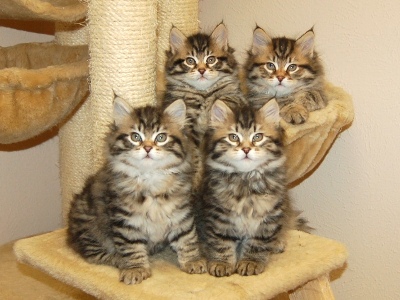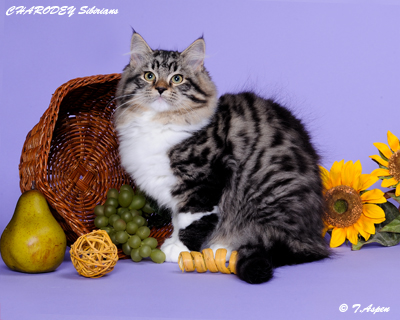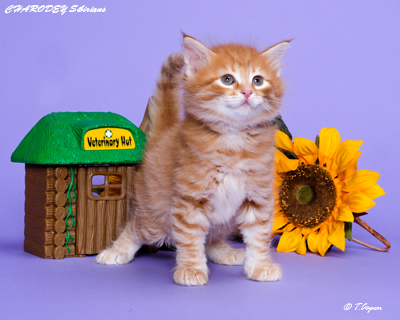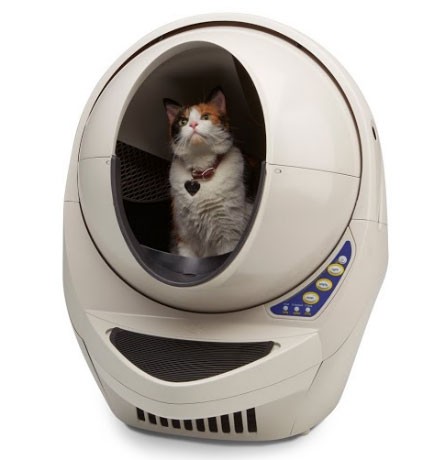 |
|
Kitten Care Guide
BEFORE BRINGING YOUR NEW KITTEN HOME

Before bringing your new kitten home think about what you will need for basic kitten care.
You will need a suitable food dish, a water bowl, a supply of kitten formula food, a brush and comb, a litter box and
cat litter and a secure cat carrier. It is also important to have a secure cat bed and bedding which can be washed
regularly, a variety of toys to keep your new baby amused and a cat activity post and scratching post to prevent
kitty sharpening their claws on your furniture.
Make sure your house is clean and any potential hazards have been removed. Many house plants are poisonous to cats
and like any other babies kittens are curious and love to chew and explore new things.
Check the LIST for a basic list of poisonous plants for
cats. There will be others that you can check online for a full list. Wires are another potential hazard so make
sure these are secure and kitty cannot chew them.
PICKING UP YOUR NEW KITTEN

When you're coming to pick up your new kitten remember to bring a secure cat carrier and bedding for the carrier
with you. An old clean towel will make the carrier comfortable. If you are traveling from long distance then you
should also bring water and food bowls and small litter box with litter with you.
Take the time to greet your kitten in his own environment and allow him the time to get to know you whilst he/she
feels secure. Use this time to ask the breeder any questions relating to kitten care and their advice on specific
issues or preferences that your kitten may have regarding diet and toys or health care. The breeder will also be able
to answer your questions about the personality of your new kitten. Each Kitten has a distinct personality and needs
to be cared for according to his/her personality. Observe your new kitten running around and playing and make sure
that you are satisfied with the health of your kitten before you take them home. Breeder will handle you a
vaccination certificate and record of worming treatments, so you can continue these at the correct time at home and
can pass this information onto your vet.
After having spent some time at the breeder's home bonding with your kitten it is now time to take them home. Make sure the
kitten is secure in their carrier and comfortable. If it is a hot day they must have adequate ventilation and be
offered water to prevent dehydration. Young kittens are very vulnerable and can deteriorate very quickly if they
dehydrate or go without food for long so make sure that once you have placed the kitten in the basket that you go
straight home and do not leave them in the basket for long. This is a very stressful time for a kitten and it is
vital that care be taken to minimize any stress. Once home the first thing that must be done is to offer the kitten
a drink and a small amount of food, preferably wet food. This will help settle the kitten. If kitten doesn't show
interest in either water or food, do not force them to eat, ones they settled and feel comfortable in new home, food
will become more of priority of their life. :)
SETTLING IN THE NEW ARRIVAL

Once your new baby has arrived home and you have made sure they have been offered food and water it is time to
introduce them to the house. Do not over stimulate them by attempting to show them the whole house in one go.
Initially limit them to one room and place in this room comfy bedding for them, food and water dishes and in another
corner of the room away from both of this place a suitable litter tray so your new kitty does not have to go looking
in an unfamiliar environment for these things and prevent accidents. Offer them attention but let them take their
time to get accustomed to the room and to you and let them approach you for attention. Playing with toys with your
new kitten is a great way to bond.
Do not overwhelm them by forcing attention on them until they are ready themselves. Let them feel secure in this room
and in your company before introducing them to any other household pets. Let other pets get accustomed to them
before meeting by letting them sniff your new kitty's bedding etc. Make sure to offer lots of fuss and attention to
your old pets to avoid jealousy issues. It can take time for pets to get used to each other so don't rush this.
Never leave a new kitten unsupervised with an older pet until you are sure they have fully accepted each other. If
this seems to be a problem in your household please speak to the breeder or your vet for further advice.
FEEDING YOUR KITTEN

It is important to ask your breeder what kitten food they have been using before they left their house and to take a
sample with you. Never try to change their diet straight away and if you wish to switch to a different brand of food
do so gradually, mixing in a little of the old brand with some of the new brand to prevent stomach upsets.
Kittens should be fed Kitten brand food and gradually move to Adult types food as they get older. Kitten foods are
easily digested and contain extra calcium and proteins to enable healthy growth and development. Cow's milk must
also NEVER be offered. Kittens cannot digest Cow's milk and most cats are lactose intolerant. Offer to your kitten
Goat Milk or Kitten Replacement Milk instead.
Kittens under 12 weeks need to be fed 4 times a day and then up to the age of 6 months 3 times daily. Your vet may
advise their own kitten feeding regime. Make sure to feed your kittens and cats only Premium Quality Foods as
advised by the breeder or your vet. It may cost a little more but can make a huge difference to development of your
kitten and to maintain the health and vitality of your cat for years to come. Correct diet can help your cat to live
a longer and healthier life and may prevent your cat from developing some of the diseases that cats can be
susceptible to such as kidney problems.
Offer to your kitten and cat a wet food on a daily basis, twice a day recommended. A fresh supply of drinking water
must be left out at all times and needs to be changed daily.
PLAYING WITH YOUR NEW KITTEN

It is important to play with your new kitten regularly to keep them engaged and interested and to help them develop
basic social and physical skills. The more you play with your kitten the stronger the bond that will develop between
you as your kitten grows into a cat. A variety of toys will enable you to quickly work out what are your kitten's
favorites. Kittens should never be left unsupervised with toys that contain string as they can quickly choke on
these or on toys with tiny removable parts. When handling your kitten do not encourage rough wrestling games. What
seems cute as a tiny kitten seems less cute when the cat is older and scratching your hands with very sharp claws
and teeth. Wrestling with a kitten on its back with your hand on its stomach may seem a game to you but in cat
language this is viewed as an aggressive act and this is why your kitten will always attack your hand. If your
kitten becomes too rough with you during play, do not shout at it or attempt to strike, shake it as this can
permanently damage the bond you have with it. Gently move the kitten away from you and say a firm no. Then if the
kitten attempts to re-engage in the same rough play, ignore it. Kittens quickly learn from this that their actions
are unacceptable behavior.
Kittens do not like to be left for long periods of time alone. If you have a new kitten in the house, and you need to
work, try to arrange for someone else to spend time with the kitten or make sure that the kitten has a playmate to
keep them company. As kittens need regular feeding, make sure fresh food is offered before you go to work and as
soon as you return. You may be tired as soon as you return but your kitten will want attention straight away as they
will have missed you.
MEDICAL CARE

Young kittens can be very susceptible to a variety of ailments and it is important that you seek appropriate medical
attention as soon as possible. Once you have brought your kitten home you should take them to your own vet to
register them and to ask for a health check. Your vet will then be able to discuss basic health care with you such
as worming and flea treatments and arrange vaccination for your kitten if they have not already received them. It is
important that you keep up with these treatments as worms and fleas can seriously affect the health of your
kitten.
Any problems with your kitten involving stomach upsets and diarrhea, decreased appetite, listlessness you should
contact your vet at the earliest opportunity for their advice. Do not try to treat your kitten yourself if you are
not experienced as you may cause your kitten to deteriorate.
GENERAL SAFETY

Please consider the general safety of your new kitten. Are you going to be allowing your new kitten outside? Kittens
should never be allowed outside until they are settled in a new home and microchipped to prevent them from getting
lost. It is important that you discuss with your breeder whether you will be allowing your new kitten unsupervised
outside access. Many breeders will not sell a kitten to a home that will allow them outside. One of the biggest
killers of cats are wild animals and road traffic accidents and no breeder or new owner wants to face the early loss
of their treasured cat or kitten. There are many ways to safely allow a cat to experience outside whilst being
safely contained. Speak to your breeder who may be able to offer advice on outdoor cat runs or cat proofing your
garden.
There are many potential Hazards around the house that you need to be aware of. Kittens are very curious and will get
into absolutely everything they can. Never leave plastic bags lying around as these can quickly choke a cat.
Electrical wiring can be very tempting to play with but if chewed can electrocute your kitten and prove a fire
hazard for yourselves. Curtain cords and blind cords are another potential hazard that needs to be kept well out of
a kitten's way when unsupervised. It is not unheard of for kittens to tangle themselves in these and die from
hanging themselves.
Check on which cleaning products you use at home as many of these are toxic to cats. Antibacterial floor and side
cleaners are available that are safe to use around pets. Mopping your floors with a toxic cleaner and then allowing
kitten access to the floor before it is fully dry will allow chemicals to soak into the kitten's fur and feet which
they can then lick off. Make sure that cupboard doors are safely closed and that bins have closed lids that cats
cannot access. Tins in the bin have interesting smells in them and contain very sharp edges that can cut your
kitten.
FINALLY, ENJOY YOUR NEW LIFE WITH YOUR KITTEN AND THE START OF A BEAUTIFUL FRIENDSHIP THAT
WILL LAST FOR MANY YEARS
We recommend LIFE'S ABUNDANCE FOOD for all your pets
ORDER YOUR KITTEN/CAT FOOD HERE

We recommend LITTER-ROBOT Automated Litter Box for all your pets
Order your AUTOMATED LITTER-ROBOT HERE
and receive $25 discount on every purchase of new LR unit

|



